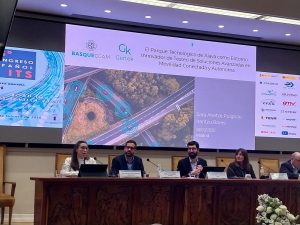The technical director of the BasqueCCAM, Sara Ahetze Puignau, at the 25th Congress of Intelligent Transport Systems (ITS) held in Madrid. He participated in the first day of the Spanish Congress. It presents the paper “The Vitoria-Gasteiz Campus as an Ecosystem of Innovation for Connected and Autonomous Mobility”.
During the presentation, the technical director of BasqueCCAM explained how work has been done to make the Vitoria-Gasteiz Campus in Miñano an ideal environment for integration and testing innovative solutions in connected, cooperative and automated mobility (CCAM). Thanks to control, low traffic density, private 5G network and MEC (Multi-Access Edge Computing) server, the PTA provides an essential testing environment.
The park infrastructure is complemented by BasqueCCAM equipment, including short-range communications RSUs (Road Side Units), parking monitoring cameras and advanced traffic management systems, such as variable messaging panels, traffic lights and environmental control equipment.
The BasqueCCAM completes these extensions with a sensorized and automated vehicle and a Traffic Control Center (TMC). This centre centralizes, monitors and manages these equipment and the mobility services associated with them.

In her speech, Sara Ahetze Puignau highlighted the work that BasqueCCAM, in collaboration with Gertek and Vicomtech, is doing in the PTA to develop and validate key functionalities for future mobility, including:
- Automated Valet Parking (AVP): Automated parking validation, parking occupancy, infrastructure vehicle communication, vehicle perception and remote driving monitoring.
- Dynamic access control: Authorization and prioritization of access to vehicles with license plates according to dynamic restrictions such as air quality control and parking occupancy.
These first innovative cases of use will make it possible to validate the deployment and services of the testing environment so that ecosystem operators, such as OEMs or technology providers, can explore their solutions. These environments enabled by the BasqueCCAM will be used as a laboratory for these agents and authorities to work on important aspects such as interoperability and data governance.
Sara Ahetze Puignau’s presentation focused on physical infrastructure, digital infrastructure, flexible regulations and the need to apply technology to mobility services, demonstrating the commitment of the Basque Country and BasqueCCAM to promote these pillars of connected, cooperative and automated mobility to make the Basque Country an essential environment for future mobility.